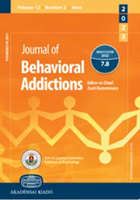Order of first-play in simulated versus monetary gambling
Order of first-play in simulated versus monetary gambling
Author(s): Alex M.T. Russell, Nerilee Hing, Philip W. S. Newall, Nancy Greer, Cassandra K. Dittman, Hannah Thorne, Matthew J. RockloffSubject(s): Media studies, Individual Psychology, Behaviorism, Substance abuse and addiction, Health and medicine and law
Published by: Akadémiai Kiadó
Keywords: simulated gambling; gambling; migration; loot boxes; social casino games; demo games; gambling problems; gambling harm;
Summary/Abstract: Background and aims: Simulated gambling products, like loot boxes and social casino games, contain gambling elements, but are not classified as gambling. They are available to minors, raising concerns about a “gateway effect” into gambling. This study examined the time course of young people’s engagement in simulated and monetary gambling, and associations between simulated gambling and gambling problems and harm. A necessary, although not sufficient, condition for simulated games leading to real money gambling is that simulated play must come first. Method: Participants were 1,026 young adults (aged 18–25 years) who played video games in the last year. They reported the age at which they first took part in seven simulated and twelve monetary gambling products, and current gambling problems and harm. Results: First use of loot boxes and video games with gambling content tended to precede monetary gambling. Forms where gambling is a core gameplay element, such as social casino and demonstration games, tended to follow some monetary gambling forms. Engagement in most simulated gambling products was associated with greater harm from monetary gambling. Discussion: The findings leave open the possibility of a catalyst pathway from youth engagement in loot boxes and games with gambling content to later monetary gambling, but causal psychosocial mechanisms remain unclear. However, a pathway from social casino and demonstration games to monetary gambling appears less likely, which may instead reflect containment or substitution effects. Simulated gambling disproportionately attracts youth who are vulnerable to gambling problems and harm, indicating the need for consumer protection measures.
Journal: Journal of Behavioral Addictions
- Issue Year: 12/2023
- Issue No: 4
- Page Range: 992-1005
- Page Count: 14
- Language: English

